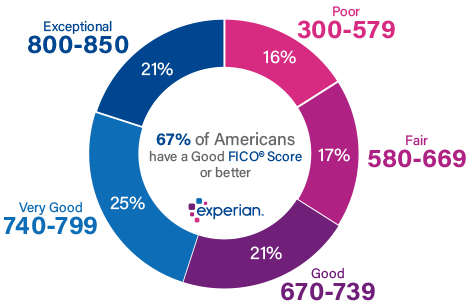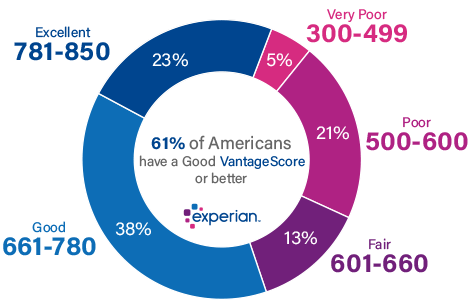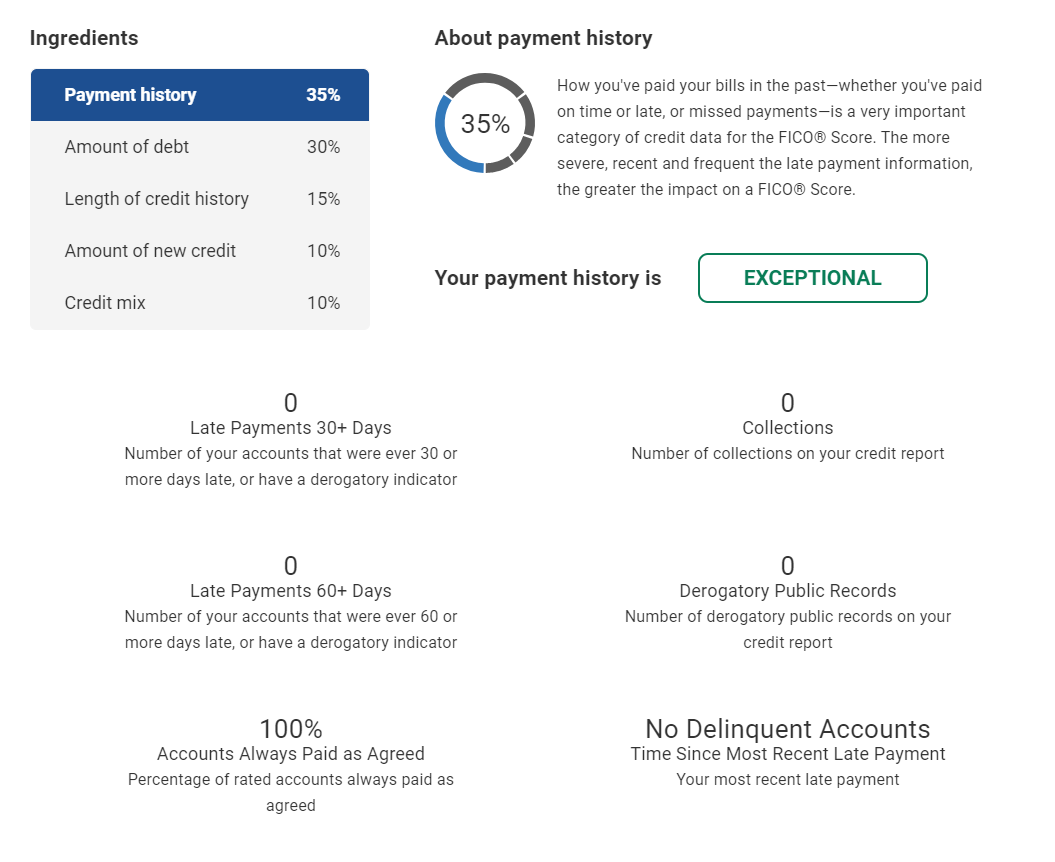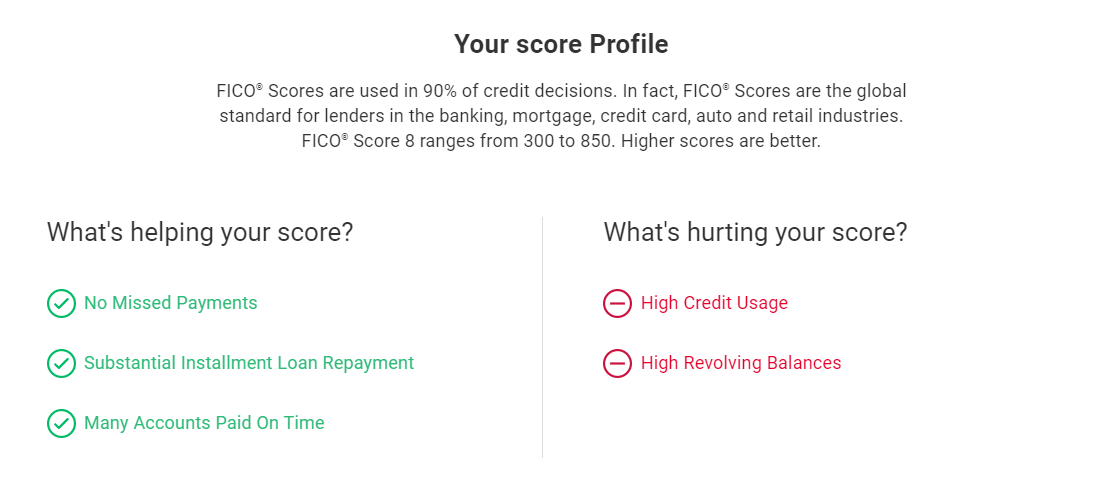In this article:
For a score with a range between 300 and 850, a credit score of 700 or above is generally considered good. A score of 800 or above on the same range is considered to be excellent. Most consumers have credit scores that fall between 600 and 750. In 2023, the average FICO® Score☉ in the U.S. reached 715.
Achieving a good credit score can help you qualify for a credit card or loan with a lower interest rate and better terms. That said, different lenders use their own criteria for deciding whom to lend to and at what rates. Here's more on what qualifies as a good credit score, what impacts your credit and how to improve your credit score.
What Is a Good FICO® Score?
The base FICO® Scores range from 300 to 850, and a good credit score is between 670 and 739 within that range.
FICO creates different types of consumer credit scores. There are "base" FICO® Scores that the company makes for lenders in multiple industries to use, as well as industry-specific credit scores for credit card issuers and auto lenders. FICO's industry-specific credit scores have a different range—250 to 900. However, the middle categories have the same groupings and a "good" industry-specific FICO® Score is still 670 to 739.

What Is a Good VantageScore?
VantageScore's first two credit scoring models had ranges of 501 to 990. The two newest VantageScore credit scores (VantageScore 3.0 and 4.0) use a 300 to 850 range—the same as the base FICO® Scores. For the latest models, VantageScore defines 661 to 780 as its good range.

What Is a Good Credit Score to Buy a House?
To increase your odds of approval and qualify for a lower-rate mortgage, you should aim to have a credit score in the good range. That's a FICO score of 670 or higher.
The minimum credit score needed to buy a house can range from 500 to 700, but will ultimately depend on the type of mortgage loan you're applying for and your lender. Most lenders require a minimum credit score of 620 to buy a house with a conventional mortgage. Other types of mortgages have different credit score requirements:
- FHA home loans typically require a credit score of at least 500 if you put 10% down or 580 if you put 3.5% down.
- USDA loans don't have a set credit score requirement, but lenders typically require a score of at least 580.
- VA loans also don't have a set minimum credit score, but lenders typically require a score of 620 or higher.
Remember that your credit score plays a role in determining the interest rate and payment terms on a mortgage loan. Lenders base the interest they charge on how risky they view you as a borrower. So while it may be possible to get a mortgage with bad credit, you're typically better off improving your score before you apply for a mortgage to qualify for good terms.
What Is a Good Credit Score to Buy a Car?
While there isn't a set minimum credit score to buy a car, you should aim to have a score of 670 or higher, which puts you in the good credit range. You'll qualify for better auto loan terms with a higher credit score.
Auto lenders view low credit as a sign of risk, so an applicant with poor or fair credit will pay more in interest to borrow a car loan. If your FICO® Score is below 670, aim to build credit before you buy a car. Reaching the "good" credit score range may help you qualify for lower interest and better terms.
What Affects Your Credit Scores?
Common factors can affect all your credit scores, and these are often split into five categories:
- Payment history: Making on-time payments on your credit accounts can help your scores. But missing payments, having an account sent to collections or filing bankruptcy could hurt your scores.
- Credit usage: How many of your accounts have balances, how much you owe and your credit utilization rate—the portion of your credit limit that you're using on revolving accounts—all come into play here.
- Length of credit history: This category includes the average age of all your credit accounts, along with the age of your oldest and newest accounts.
- Types of accounts: Also called "credit mix," this considers whether you're managing both installment accounts (such as a car loan, personal loan or mortgage) and revolving accounts (such as credit cards and other types of credit lines). Showing that you can manage both types of accounts responsibly generally helps your scores.
- Recent activity: This considers whether you've recently applied for or opened new accounts.
FICO and VantageScore take different approaches to explaining the relative importance of the categories.
FICO® Score Factors
FICO uses percentages to represent generally how important each category is, though the exact percentage breakdown used to determine your credit score will depend on your unique credit report. FICO considers scoring factors in the following order:
- Payment history: 35%
- Amounts owed: 30%
- Length of credit history: 15%
- Credit mix: 10%
- New credit: 10%
VantageScore Factors
VantageScore lists the factors by how influential they generally are in determining a credit score, but this will also depend on your unique credit report. VantageScore considers factors in the following order:
- Total credit usage, balance and available credit: Extremely influential
- Credit mix and experience: Highly influential
- Payment history: Moderately influential
- Age of credit history: Less influential
- New accounts opened: Less influential
What Information Credit Scores Do Not Consider
FICO and VantageScore do not consider the following information when calculating credit scores:
- Your race, color, religion, national origin, sex or marital status. (U.S. law prohibits credit scoring formulas from considering these facts, as well as any receipt of public assistance or the exercise of any consumer right under the Consumer Credit Protection Act.)
- Your age.
- Your salary, occupation, title, employer, date employed or employment history. (Keep in mind, however, that lenders may consider this information in making their overall approval decisions.)
- Where you live.
- Soft inquiries. Soft inquiries are usually initiated by others, like companies making promotional offers of credit or your lender conducting periodic reviews of your existing credit accounts. Soft inquiries also occur when you check your own credit report or when you use credit monitoring services from companies like Experian. These inquiries do not impact your credit scores.
Why There Are Different Credit Scores
Credit scores are a tool that lenders use to make lending decisions. FICO and VantageScore create different credit scoring models for lenders, and both companies periodically release new versions of their credit scores models—similar to how other software companies may offer new operating systems. The latest versions might incorporate technological advances or changes in consumer behavior, or better comply with recent regulatory requirements.
For example, VantageScore creates a tri-bureau scoring model, meaning the same model can evaluate your credit report from any of the three major consumer credit bureaus (Experian, TransUnion and Equifax). The first version (VantageScore 1.0) was built in 2006. The latest version, VantageScore 4.0, was released in 2017 and developed based on data from 2014 to 2016. It was the first generic credit score to incorporate trended data—in other words, how consumers manage their accounts over time.
FICO is an older company, and it was one of the first to create credit scoring models based on consumer credit reports. It creates different versions of its scoring models to be used with each credit bureau's data, although recent versions share a common name, such as FICO® Score 8. There are two commonly used types of consumer FICO® Scores:
- Base FICO® Scores: These scores are created for any type of lender to use, as they aim to predict the likelihood that a consumer will fall behind on any type of credit obligation. Base FICO® Scores range from 300 to 850.
- Industry-specific FICO® Scores. FICO creates auto scores and bankcard scores specifically for auto lenders and card issuers. Industry scores aim to predict the likelihood that a consumer will fall behind on the specific type of account, and the scores range from 250 to 900.
FICO industry-specific scores are built on top of a base FICO® Score, and FICO periodically releases new suites of scores. The FICO® Score 10 Suite, for instance, was announced in early 2020. It includes a base FICO® Score 10, a FICO® Score 10 T (which includes trended data) and new industry-specific scores. Mortgage lenders who work with government-backed mortgage companies Fannie Mae and Freddie Mac will be required to use FICO 10 T and VantageScore 4.0 credit scores in evaluating borrower eligibility in the coming years.
There are scores used more rarely as well. For instance, FICO's UltraFICO® Score allows consumers to link checking, savings or money market accounts and considers banking activity. Lenders may also create custom credit scoring models designed with their target customers in mind.
For the most part, lenders can choose which model they want to use. In fact, some lenders might decide to stick with older versions because of the investment that could be involved with switching.
You also often won't know which credit report and score a lender will use before you submit an application. The good news is all the consumer FICO and VantageScore credit scores rely on the same underlying information—data from one of your credit reports—to determine your credit scores. They also all aim to make the same prediction—the likelihood that a person will become 90 days past due on a bill (either in general or a specific type) within the next 24 months.
As a result, the same factors can impact all your credit scores. If you monitor multiple credit scores, you could find that your scores vary depending on the scoring model and which one of your credit reports it analyzes. But, over time, you may see they all tend to rise and fall together.
Why Having a Good Credit Score Is Important
Having good credit can make achieving your financial goals easier. It could be the difference between qualifying or being denied for an important loan, such as a home mortgage or car loan. And, it can directly impact how much you'll have to pay in interest or fees if you're approved.
For example, the difference between taking out a 30-year, fixed-rate $250,000 mortgage with a 620 FICO® Score and a 670 FICO® Score could be $161 a month. That's extra money you could be putting toward your savings or other financial goals. Over the lifetime of the loan, having the better score would save you $57,842 in interest payments. Learn more about what credit score you need to buy a house.
Additionally, credit scores can impact non-lending decisions, such as whether a landlord will agree to rent you an apartment.
Your credit reports can also impact you in other ways. Some employers may review your credit reports (but not your credit scores) before making a hiring or promotion decision. And, in most states, insurance companies may use credit-based insurance scores to help determine your premiums for auto, home and life insurance.
How to Improve Your Credit Scores
To improve your credit scores, focus on the underlying factors that affect your scores. At a high level, the basic steps you need to take are fairly straightforward:
- Make at least your minimum payment and make all debt payments on time. Even a single payment made 30 days or more late can hurt your credit scores and it'll stay on your credit report for up to seven years. If you think you may miss a payment, reach out to your creditors as quickly as possible to see if they can work with you or offer hardship options.
- Keep your credit card balances low. Your credit utilization rate is an important scoring factor that compares the current balance and credit limit of revolving accounts such as credit cards. Having a low credit utilization rate can help your credit scores. Those with excellent credit scores tend to have an overall utilization rate in the single digits.
- Open accounts that will be reported to the credit bureaus. If you have few credit accounts, make sure those you do open will be added to your credit report. These could be installment accounts, such as student, auto, home or personal loans, or revolving accounts, such as credit cards and lines of credit.
- Only apply for credit when you need it. Applying for a new account can lead to a hard inquiry, which may hurt your credit scores a little. The impact is often minimal, but applying for many different types of loans or credit cards during a short period could lead to a larger score drop.
Other factors can also impact your scores. For example, increasing the average age of your accounts could help your scores. However, that's often a matter of waiting rather than taking action.
Checking your credit scores might also give you insight into what you can do to improve them. For example, when you check your FICO® Score 8 from Experian for free, you can also look to see how you're doing with each of the credit score categories.

You'll also get an overview of your score profile, with a quick look at what's helping and hurting your score.

What to Do if You Don't Have a Credit Score
Credit scoring models use your credit reports to determine your score, but they can't score reports that don't have enough information.
For FICO® Scores, you need:
- An account that's at least six months old
- An account that has been active in the past six months
VantageScore can score your credit report if it has at least one active account, even if the account is only a month old.
If you aren't scoreable, you may need to open a new account or add new activity to your credit report to start building credit. Often this means starting with a credit-builder loan or secured credit card, or becoming an authorized user.
In addition, you can begin establishing credit immediately with Experian Go™. Experian Go helps you jump start your credit by creating an Experian credit report for you even if you don't have any credit accounts yet. It then provides you with personalized insights on how to move forward with building credit.
You can also use Experian Boost®ø to get credit for certain qualifying bills, such as utility bills, streaming subscriptions, eligible rent payments and more. This can help you build a positive payment history using regular monthly bills, which can instantly increase your score.
Why Your Credit Score Changed
Your credit score can change for many reasons, and it's not uncommon for scores to move up or down throughout the month as new information gets added to your credit reports.
You may be able to point to a specific event that leads to a score change. For example, a late payment or new collection account will likely lower your credit score. Conversely, paying down a high credit card balance and lowering your utilization rate may increase your score.
But some actions might have an impact on your credit scores that you didn't expect. Paying off a loan, for example, might lead to a drop in your scores, even though it's a positive action in terms of responsible money management. This could be because it was the only open installment account you had on your credit report or the only loan with a low balance. After paying off the loan, you may be left without a mix of open installment and revolving accounts, or with only high-balance loans.
Perhaps you decide to stop using your credit cards after paying off the balances. Avoiding debt is a good idea, but lack of activity in your accounts could lead to a lower score. You may want to use a card for a small monthly subscription and then pay off the balance in full each month to maintain your account's activity and build its on-time payment history.
Keep in mind that credit scoring models use complicated calculations to determine a score. Sometimes you might think one event caused your score to increase or decrease, but it was a coincidence (for example, you paid off a loan, but your score actually increased due to a lower credit utilization ratio). Also, a single event isn't "worth" a certain amount of points—the point change will depend on your entire credit report.
A new late payment could lead to a large point drop for someone who's never been late before, for example, as it may indicate a change in behavior and, in turn, credit risk. However, someone who has already missed many payments might experience a smaller point drop from a new late payment because it's already assumed that they're more likely to miss payments.
Monitor Your Credit Report and Score
Checking your credit score right before you apply for a new loan or credit card can help you understand your chances of qualifying for favorable terms—but checking it further ahead of time gives you the chance to improve your score, and possibly save hundreds or thousands of dollars in interest.
Experian offers free credit monitoring, which, in addition to a free score and report, includes alerts if there's a suspicious change in your report. Keeping track of your score can help you take measures to improve it so you'll increase your odds of qualifying for a loan, credit card, apartment or insurance policy—all while improving your financial health.
Learn More About Credit Scores
- The Complete Guide to Understanding Credit Scores
Understanding how credit scores work can help you improve your credit profile and enjoy the benefits of good credit. Here's what you need to know. - How to Improve Your Credit Score
Strengthening your credit profile involves several steps, including making on-time payments, reducing your debt and more. Here's how you can do it. - What Affects Your Credit Scores?
Credit scoring software combs and analyzes credit reports to evaluate how you manage credit, with particular focus on just a handful of factors. - What Is a Credit Utilization Rate?
Your credit utilization rate is the percentage of your revolving accounts’ balances that you’re using. - How to Build Credit
Building a good credit score can take time, so it's important to start working now so you can build a good score for when you need it. - What Are the Different Credit Score Ranges?
Most credit scores range from 300 to 850, but find out what the different scores mean and which scores have bigger ranges.

